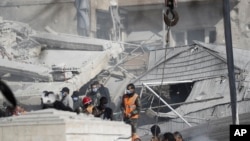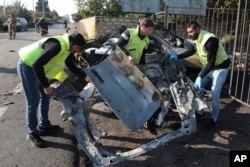An apparent Israeli attack on an Iranian military target Saturday in the Syrian capital of Damascus has killed at least five top commanders of Tehran's elite al Quds Forces.
The attack leveled a residential building, burying victims under the rubble. Syrian TV showed a crane trying to remove debris from the collapsed building to pull bodies from under the rubble.
Israel has not officially commented on whether it was behind the attack.
Rami Abdul Rahman of the London-based Syrian Observatory for Human Rights told Arab media that he believes an Israeli rocket struck the building, causing it to collapse.
He said that an Israeli missile struck the building despite some reports that a car bomb caused the explosion, which resulted in the building (housing the Iranian commanders) to collapse. He said that the area that was hit has an Iranian Revolutionary Guard presence as well as forces belonging to the Islamic Jihad organization and Lebanon's Hezbollah militia.
London-based Iran analyst Mehrdad Khonsari told VOA that Israeli attacks on targets in Syria have been increasing in recent months, especially after the October 7 Hamas terror attack on southern Israel, and that many of the Iranian commanders are plotting attacks on Israeli targets inside Israeli territory.
"The ensuing goings on in Gaza have obviously accelerated and increased the number of Israeli attacks on such targets, some of which are a response to actions being taken by these elements who have hit against Israeli locations where people live on the Israeli side of the Syrian border, across from the Golan (Heights), and more importantly across the Lebanese border, given the fact that supplies for Hezbollah in Lebanon come through Syria," Khonsari said.
Arab media reported that an Israeli drone also targeted a vehicle in southern Lebanon in which two Hezbollah commanders were riding Saturday afternoon, destroying it. The victims' charred remains were reportedly taken to a hospital for identification.
Joshua Landis, who heads the Middle East studies program at the University of Oklahoma, tells VOA that he thinks both Israel and Iran are trying to draw the United States into a larger regional conflict by some of their actions.
"Already, just over a week ago, Israel killed the top (Iranian) al Quds commander in Syria, along with a bunch of his associates, and this put tremendous pressure on Iran to respond and now, just at a time when we needed a little calm to try and talk this down," said Landis. "The Israeli assassination of top Iranian leaders (in Damascus) is going to force Iran's hand and the supreme leader (Ali Khamenei) will have to retaliate."
Landis noted that Iran has responded in the past week by sending missiles to Syria, stressing that "the many Israeli and American attacks on Iranian leaders (has) built pressure on Iran to act."
"Nations whose people get killed often strike out in very irrational ways," he said. "We're going to see this from Iran."
Landis stressed that U.S. forces in both Iraq and Syria have been targeted by pro-Iranian militia fighters in recent days and weeks. He added Iran has tried to draw the U.S. into a wider regional conflict by using Yemen's Houthis to target U.S. ships in the Red Sea.
Iran's supreme leader has repeatedly urged the Houthis, who receive Iranian missiles and drones, to step up their attacks against U.S. vessels in the Red Sea and the Gulf of Aden. Both Iranian Revolutionary Guard forces and Lebanon's Hezbollah militia reportedly have commanders in Yemen to advise the Houthis.





